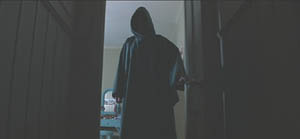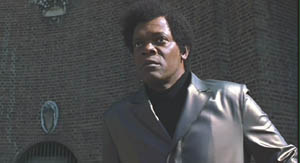|
Well, here we are again to experience a bitter, scalding end, as the engines flame out and another career plunges straight into a mountainside like that model plane in Indiana Jones and the Temple of Doom, only with more fire and wreckage and without the obvious fakery. From this point forward, M. Night Shyamalan's star would be hopelessly fallen, much like the planet Venus in Isaiah 14:12, which everyone thinks is about Satan because they ignore the context. Christians...Jesus Christ, they're annoying. It's plainly a metaphor for the loss of brilliance, a poetic regret that something which once showed such promise has faded away like the last star at dawn. Other parts of scripture refer to making cow shit sandwiches (Ezekial 4:15), which, although not metaphorical, could make for a pretty good metaphor for the remainder of Night's film career thus far. The fuck happened here? This director's most recent offerings (Lady in the Water, The Happening) are so lame and contrived I found myself questioning my own memories of this film, which I'd recalled enjoying. So I went back, and gave it another look. 
I still like it. Really, what the fuck happened? After the wholly unexpected success of The Sixth Sense, M. Night's third film, Unbreakable's performance was somewhat lukewarm, probably more because of its similarities to its predecessor than in spite of them. People expect, or can at least accept, that a ghost flick will be quiet and creepy and dark. A film dealing with the idea of comic book superheroes (and the idea of comic books in general) is, on the other hand, generally expected to have lots of explosions and flipping cars and narrowly-averted airplane disasters, and not a minute-long, deliberately unimpressive hand-to-hand struggle as a primary action piece. Still, I find much to like about Unbreakable. It takes a normally noisy genre and contributes a more sober, thoughtful example. This is, of course, the same thing he tried again with Signs, which I found to be a spectacular failure for a heapton of reasons. Here, however, he still seems to be exhibiting that sure hand and quiet dignity that availed him well on his breakout film. A man working as a security guard, played by Bruce Willis, is the only survivor of a terrible train crash, emerging without so much as a bruise, and is shortly thereafter contacted by a collector of comic-book art who's convinced that Willis' David Dunn could be an archetypical hero the likes of which spawned the sorts of tales of heroism and great deeds now only found in kids' comics. While skeptical that he could be more than an average man, David begins to realize that he has indeed slid through life without any injuries or sickness, and begins to develop his already sharp instincts for sniffing out potential trouble. The comic collector, Elijah Price (Samuel L. Jackson in a far more understated role than his usual wont), who has brittle bones and has lived a hard life of constant injuries, sees in David the potetial for his antithesis, a man who cannot be hurt, and encourages David to become the hero the world needs. 
Shyamalan has pretty much one way of approaching a story. Let's face it; good or bad, all of his films issue from a very obviously common source and tend to focus on the same issues. His stories all seem to center on an unlikely hero finding his niche in the world. I won't belabor what a psychologist might infer from such a repeated theme, but it's clear that his protagonists all long for a special task that will allow them to feel at peace and at home in the world. Marital malaise, often-hokey spiritualism, speech impediments and a repeated device of hydrophobia tend to pop up in many of his works. The director's eye is his greatest strength, always strong and subtle even when the material doesn't match it. The shot composition here is thing of beauty, and often stands in for use of actual dialogue, a simple pan or subtle look off of Willis substituting for rambling exposition. The style is vintage Spielberg with a side of Hitchcock, and that's not a bad thing, if not totally original. Where the difference arises is in the quality of his scripts, all self-penned. Here, he's staying small, keeping the focus personal. David's marital difficulties feel like an integral part of the story, and not, as with The Happening, as if they've been shoehorned in because it's what's expected of him. He avoids stretching the story beyond the confines it needs, and his hero's desire, to feel as though he has a sense of purpose, comes across as honest due to its healthy restraint; no one here is trying to find the hand of God in his son's asthma or on the back of a goddamn cereal box. Jackson plays a wonderfully tragic character, his normal bravado sublimated into a more brooding and needful persona. While it's not very convincing to me that his childhood peers would've named him "Mr Glass," inasmuch as I don't imagine children referring to anyone in their own age group as "Mr." anything (by its very nature, the honorific ascribes authority to the one simultaneously being belittled), we see how his condition has embittered him without it taking over the scenery. While comic-book rules apply here, comic-book style does not, and Shyamalan has managed to create a pretty convincing version of a superhero tale as seen in the context of the real world, one of the best attempts to date, not that there have been many. Reportedly this was to be the origin story for a proposed trilogy, but the subsequent chapters have yet to be made, which is a shame, as I'd have likely preferred them over the two films he actually made afterwards. So what happened? I can't say for sure, but I think perhaps the infamous '80s punk band Dead Kennedys put it best with the lyric "No one's their best when they believe their own press." Maybe overconfidence produced too much sloppiness and not enough care in his later work. Maybe a good dose of that sense of need to find one's way that pervades almost everything he writes needs to go home to roost. Or maybe he only ever had two good films in him to start with. It's unfortunate, but at least that's two more than Michael Bay has in him. People (myself included) slag on M. Night not because he's a hack, but because he's a guy with real talent who's doing hack work, and it's a letdown. So come on, man; prove us wrong. I wouldn't mind it. -review by Matt Murray
|
|
||||||||